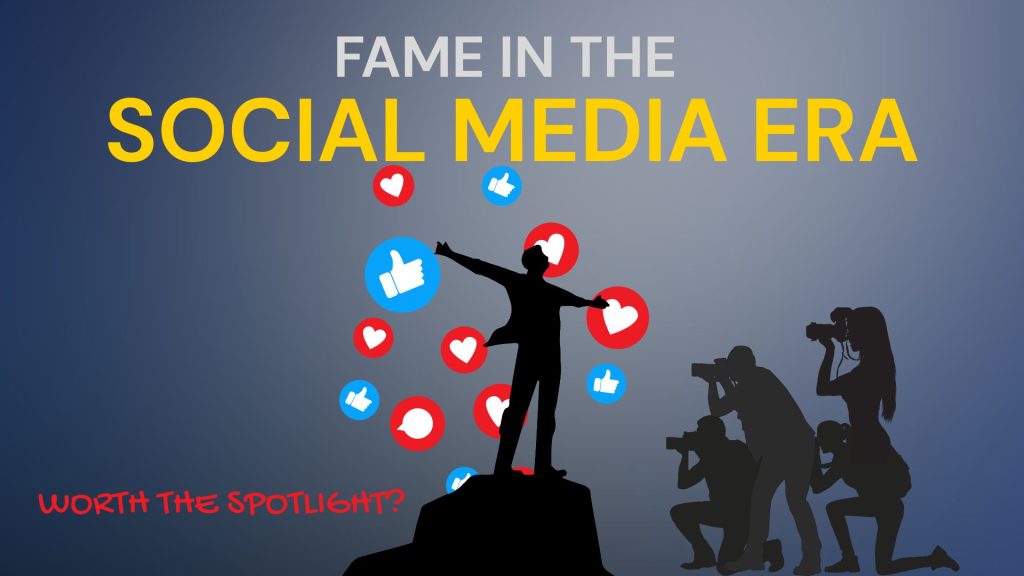Home » Uncategorized » Fame in the Social Media Era: Worth the Spotlight?
Fame in the Social Media Era: Worth the Spotlight?

Learn continually – there’s always “one more thing” to learn! – Steve Jobs
“Price is what you pay, value is what you get”
Fame has always been magnetic. Ancient emperors carved their names on stone, poets longed for their verses to outlive them, and movie stars once depended on paparazzi to cement their legacy. Today, you don’t need a Hollywood agent or a recording contract – you just need a smartphone, Wi-Fi, and the courage to hit “post.”
But is fame worth chasing in today’s hyperconnected world? With your real name, face, and voice floating permanently in digital space, what’s the reward – and what’s the price? Let’s explore this question, especially for young leaders in Asia who are navigating both traditional values and modern digital realities.
The Allure of Fame
Being known by thousands – or millions – can be intoxicating. Fame offers:
Opportunity: A strong personal brand opens doors. Think of Jack Ma’s charisma in Alibaba’s early days or Michelle Yeoh’s global recognition leading to her Oscar. Fame often translates into influence, career acceleration, and financial gains.
Voice & Impact: If you want to champion causes – whether climate action, financial literacy, or women’s empowerment – fame amplifies your reach. People listen when they recognise your name.
Leverage: In business and leadership, visibility is currency. The right profile can attract investors, clients, or collaborations far beyond cold outreach.
In short, played right, fame is an asset.
The Hidden Costs of Fame
Yet, the spotlight comes with shadows.
Privacy is a luxury lost
Every post becomes public property. Strangers may debate your choices, your looks, even your family. In Asia, where family honor and respectability carry weight, one careless remark can create ripple effects that embarrass not just you but also those you love.The Pressure to Perform
Fame demands constant feeding. Stop posting and the algorithm forgets you. Keep posting and you risk burnout or inauthenticity. Either way, fame is hungry.Misinterpretation & Cancel Culture
A slip of the tongue or an old post can resurface, and judgment can be swift. Many celebrities in Asia – from K-pop idols to entrepreneurs – have seen years of reputation undone overnight.Mental Health Strain
Comparison, criticism, and the endless chase for likes can erode confidence. Leaders who are otherwise grounded in boardrooms may feel vulnerable in the comment section.
Lessons from Real Examples
Naomi Osaka (Japan): Her candidness about mental health reshaped how athletes are viewed, but also highlighted how fame can intensify internal battles.
K-Pop Idols: Fame in Korea brings global fanbases and financial success – but the intense scrutiny has tragically contributed to several young stars’ struggles with depression.
Jack Ma (China): Once the face of China’s entrepreneurial spirit, his outspoken remarks led to regulatory backlash. Fame can magnify your voice – and your risks.
Regional Influencers: In Singapore, Malaysia, or Indonesia, social-media entrepreneurs like JianHao Tan or Magdalene Wong show how fame can be monetised effectively – but also reveal the fragility of depending entirely on public attention.
As we can see, being famous or popular is not enough. It counts as an asset ONLY if one knows how to LEVERAGE it correctly for significant good to ourselves and others.
Myths About Fame
“Fame equals wealth.” Not always. Plenty of viral influencers struggle to monetise their reach. Followers don’t pay the bills unless you have a strategy.
“Fame is freedom.” Actually, it can be a cage. Your brand dictates what you can or cannot say. Authenticity sometimes takes a back seat to expectations.
“I can control the narrative.” Once content is online, it can be clipped, twisted, or taken out of context. Control is an illusion.
Advice for Young Leaders
Decide Your Why
Do you want fame to amplify a cause, build trust, or simply for validation? Be clear. Fame without purpose feels hollow – and audiences sense it.Protect Your Boundaries
Share, but not everything. Keep sacred spaces – family, relationships, downtime – off the grid. Fame doesn’t require full exposure.Play the Long Game
Avoid gimmicks for short-term attention. Substance sustains. Consistency in delivering value builds respect far deeper than clickbait.Invest in Resilience
Criticism will come. Develop the inner strength to absorb blows without losing focus. Have mentors and peers who keep you grounded.Leverage, Don’t Depend
Use fame as a tool, not a crutch. Build skills, networks, and businesses that thrive even if your follower count disappears tomorrow.
What to Watch Out For
Digital Permanence: Screenshots live forever. Think twice, post once.
Echo Chambers: Fame can trap you in bubbles of praise or hate. Seek honest feedback outside social media.
Exploitation: Managers, brands, or even “friends” may ride your fame for their benefit. Keep contracts tight and values intact.
Cultural Sensitivity: Asia is diverse, with sharp cultural and political sensitivities. A joke acceptable in one place may offend in another.
Wise Words to Remember
“It takes 20 years to build a reputation and five minutes to ruin it.” – Warren Buffett
“Fame is a vapor, popularity an accident, riches take wings. Only one thing endures: character.” – Horace Greeley
“With great power comes great responsibility.” – Uncle Ben, Spider-Man
And a lesser-quoted but important reminder from Confucius:
“The superior man is modest in his speech, but exceeds in his actions.”
Final Thoughts
For young leaders in Asia, fame is neither inherently good nor bad. It’s a double-edged sword. In the age of TikTok reels, LinkedIn thought leadership, and YouTube channels, you can grow influence faster than any previous generation. But the cost – privacy, pressure, and permanence – is real.
The wiser approach is not to chase fame for its own sake, but to cultivate visibility with purpose. Use your platform to share insight, uplift others, and embody the values you wish to be remembered for. Fame then becomes less about being known by everyone – and more about being remembered by the right ones.
Because in the end, it’s not how many people know your name, but how many lives you’ve touched that defines the legacy of a true leader.
Comment: Is there any tip/hack that you have personally used in order to learn things quickly which has not been covered in this blog?
Let me know in the comment section below, I would love to hear your stories.
Share This Post, Choose Your Platform!
Categories
- Mental Resilience
- Emotional Resilience
- Financial Resilience
- Interpersonal Resilience
- Physical Resilience
